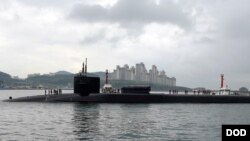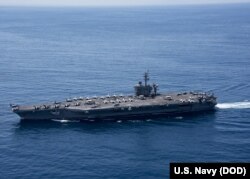U.S. nuclear-powered submarine, the USS Michigan, arrived Tuesday for a port call in South Korea, and the navies of those two countries joined Japan in exercises in the waters west of the Korean peninsula amid heightened tensions with North Korea.
The naval exercises are scheduled to last through Wednesday, the same day President Donald Trump has invited all 100 U.S. Senators to the White House for a classified briefing that will primarily concern North Korea.
The briefing will be conducted by Defense Secretary Jim Mattis, Secretary of State Rex Tillerson, Director of National Intelligence Dan Coats and the Chairman of the Joint Chiefs of Staff, General Joe Dunford.
While lawmakers often receive classified briefings on Capitol Hill, it is rare for them to take place at the White House and for the entire Senate to be involved in one event.
During a White House lunch with ambassadors of United Nations Security Council member states on Monday, the U.S. president called unacceptable the “status quo in North Korea.”
Trump said the Security Council must be prepared to impose additional and stronger sanctions on North Korea’s nuclear and ballistic missile programs.
“North Korea is a big world problem, and it’s a problem we have to finally solve,” the president added. “People have put blindfolds on for decades, and now it’s time to solve the problem.”
The comments came after Trump made his latest round of separate telephone calls to the leaders of Japan, China and Germany to discuss concerns about North Korea.
His most recent call was made just before meeting the ambassadors on Monday morning to German Chancellor Angela Merkel to discuss the “urgent security challenge” posed by North Korea, according to the White House.
A 30-minute call (Sunday evening U.S. time/Monday morning in Asia) between Trump and Japanese Prime Minister Shinzo Abe was meant to increase pressure on Pyongyang not to engage in further provocative actions, but was not prompted by any significant change in the situation, according to officials in Tokyo.
"We agreed to strongly demand North Korea, which is repeating its provocation, show restraint," Abe told reporters in Tokyo. "We will maintain close contact with the United States, maintain a high level of vigilance and firmly respond."
China's role
Abe also said he and Trump agreed that a larger role in dealing with Pyongyang should be played by China.
Trump subsequently spoke to Chinese President Xi Jinping about North Korea.
The Chinese president said he hopes all sides avoid doing anything to worsen the tense situation on the Korean peninsula, according to the Xinhua news agency.
Trump, in the phone call with Xi, “criticized North Korea’s continued belligerence and emphasized Pyongyang’s actions are destabilizing the Korean Peninsula,” according to a White House readout issued Monday. “The two leaders reaffirmed the urgency of the threat posed by North Korea’s missile and nuclear programs, and committed to strengthen coordination in achieving the denuclearization of the Korean Peninsula.”
North Korea’s continued development of ballistic missiles and its underground nuclear tests [there have been five, so far] are “to put it mildly, a game changer,” State Department spokesman Mark Toner told reporters on Monday. “And it’s one of the reasons why you’ve seen administration officials talking so candidly about our concerns and about the fact that the time for strategic patience and that policy is over.”
Trump and U.S. officials have repeatedly said all options remain “on the table” to deal with further North Korean provocations.
US Navy strike force
On Tuesday, the nuclear powered USS Michigan arrived in South Korea as a U.S. Navy strike force, led by the USS Carl Vinson, heads to the region.
The strike force on Monday was wrapping up a “routine” joint drill “to provide combined maritime response” with components of the Japanese Maritime Self Defense Force in the Philippines Sea “as it continued its northern transit,” U.S. Navy Capt. Jeff Davis told reporters at the Pentagon.
Officials in Seoul announced earlier Monday the Vinson is also scheduled to hold a joint training exercise with South Korean naval ships.
The approach of the American naval carrier strike group has not gone unnoticed in Pyongyang.
“Our revolutionary forces are combat-ready to sink a nuclear-powered aircraft carrier with a single strike,” read a Sunday commentary in the Rodong Sinmun, the Workers’ Party newspaper.
Such threats are common from the reclusive state.
North Korea on Tuesday celebrates the anniversary of the founding of its military, a key holiday in the country.
There are concerns Pyongyang, in conjunction with the anniversary, will demonstrate a show of force by possibly firing more ballistic missiles or conducting its sixth nuclear test.







